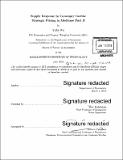Supply response to consumer inertia : strategic pricing in Medicare Part D
Author(s)
Wu, Yufei, Ph. D. Massachusetts Institute of Technology
DownloadFull printable version (4.318Mb)
Other Contributors
Massachusetts Institute of Technology. Department of Economics.
Advisor
Amy Finkelstein.
Terms of use
Metadata
Show full item recordAbstract
A growing literature has documented evidence that consumers in health insurance markets are inertial, or behave as though they face substantial switching costs in choosing a health insurance plan. I investigate whether the private firms that provide prescription drug insurance through Medicare Part D exploit this inertia when setting prices. I first document descriptive evidence consistent with insurers initially setting low prices in order to "invest" in future demand before later raising prices to "harvest" inertial consumers. I then apply a two-step estimation approach following Bajari, Benkard and Levin (2007) to explore the implications of these invest and harvest incentives for equilibrium pricing, finding that on net, demand inertia reduces equilibrium prices (i.e. the invest incentive dominates the harvest incentive). Finally, I evaluate welfare consequences of policies that could be used to constrain insurers' ability to conduct such "invest-then-harvest" pricing patterns. I find, for example, that a policy change to cap premium increases would improve consumer welfare by both lowering average premiums and smoothing prices over time.
Description
Thesis: S.M., Massachusetts Institute of Technology, Department of Economics, 2016. "June 2016." Cataloged from PDF version of thesis. Includes bibliographical references (pages 53-56).
Date issued
2016Department
Massachusetts Institute of Technology. Department of EconomicsPublisher
Massachusetts Institute of Technology
Keywords
Economics.